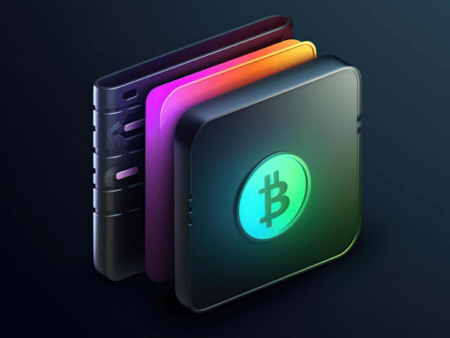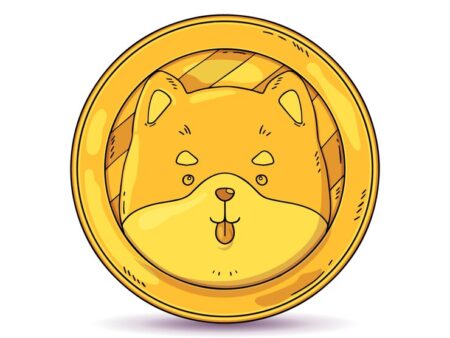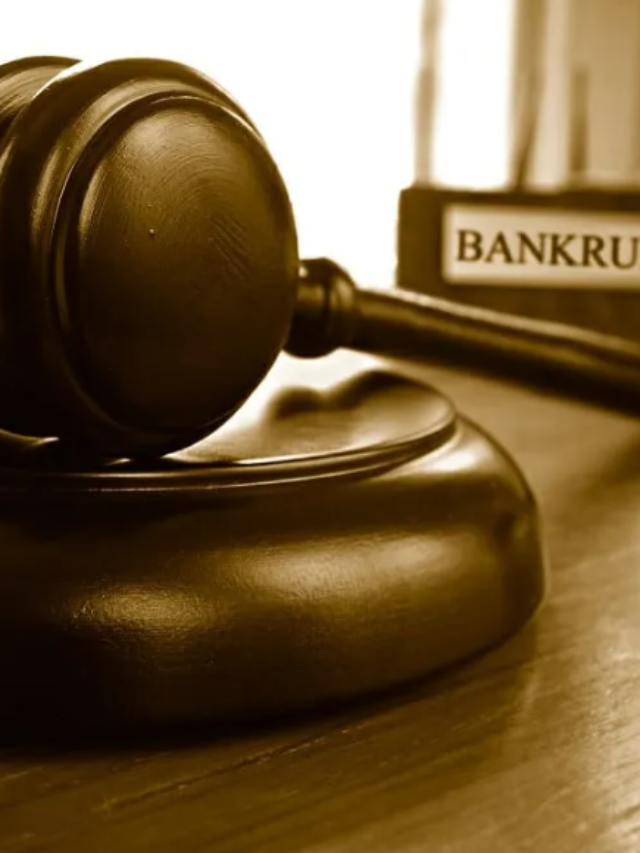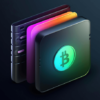Non-fungible tokens (NFTs) have grown in value over the last several years and drawn thousands of users and investors from all over the world. Regretfully, hackers take advantage of weaknesses in cryptocurrency wallets and trading platforms to steal precious digital assets from their holders.
Since they are becoming more widely recognized and valuable, it is crucial to take the required precautions to safeguard your digital assets. This article describes the most typical frauds and offers advice on how to protect your NFTs.
Tips to Protect Your NFTs
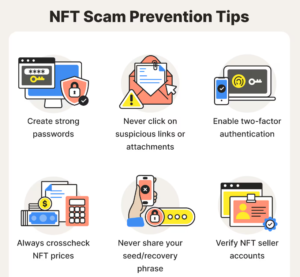
These pointers will help you protect your NFT investments.
-
Engage in Only Credible NFT Marketplace Transactions
When it comes to protecting your digital assets, using reputable and well-established NFT markets is preferable to carrying out transactions using unidentified, independent protocols.
Some of the best NFT markets give their consumers extra protection by providing a safe environment to trade NFT. These platforms include Nifty, SuperRare, Rarible, and OpenSea.
The majority of the top decentralized NFT markets are compatible with MetaMask, a popular non-custodial digital wallet that gives users total control over their assets. By using reputable and safe NFT trading platforms, investors can reduce their chances of falling victim to fraud or losing their money.
-
Don’t Click on Random Website Links and Google Ads
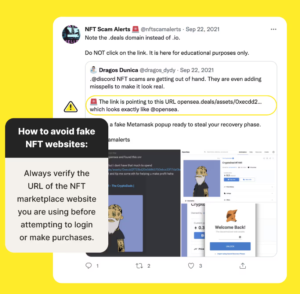
The majority of phishing schemes try to trick people into linking their wallets to a phony website. Investors who are gullible enough to ignore subtle variations in the site’s URL and appearance may fall for the traps of scammers who develop phony websites and applications that closely resemble the real thing.
Plagiarism websites frequently target well-known NFT projects and markets in an effort to trick users into divulging private information. The Bored Ape Yacht Club Instagram attack, in which con artists took over $2.5 million in NFTs, demonstrates the sophistication and lethality of phishing scams.
Therefore, it’s important to avoid clicking on unrelated links and Google advertisements, as they can be dangerous.
-
Never Sign Any Transaction You’re Not Sure of
Signing transactions you’re not sure about and being cautious are two more ways to guard against NFT theft. A smart contract function that gives the marketplace permission to execute a transaction must be signed in order for it to be approved.
Still, some features allow the smart contract to move your digital assets. Malicious actors may be able to take your complete collection of NFTs if you enable this capability on your wallet. As a result, make sure you wait to sign asset transfers until you are certain.
Check the website you’re using at all times. Observe the URL, look for mistakes, and bookmark all of the cryptocurrency exchanges and services you use.
-
Make Use of a Hardware Wallet
Using a hardware wallet, often called cold storage, can increase the security of your NFT holdings. Even while well-known non-custodial wallets like MetaMask offer some security and control, they nevertheless handle transactions that hackers may exploit.
Hardware wallets, on the other hand, such as those made by Trezor and Ledger, are tangible objects that increase security. Your wallet’s private key is never visible to devices that are connected to the internet since these wallets require users to sign transactions within the device using their private keys locally. Put otherwise, no transaction or smart contract may be signed without their “permission.”
-
Keep Your Seed Phrase Safely Stored
If you store your digital assets in a hardware wallet, you are solely responsible for ensuring their security. First and foremost, you must save your seed phrase—which stands in for your private key—in a safe place.
The seed phrase, also known as the secret recovery phase, usually consists of 12 or 24 words that represent your private key and grant full access to your wallet and valuables.
Because sharing your seed phrase with anyone will grant them access to your NFTs and cryptocurrency assets, you must never share it with anyone. However, always remember to back up your data fully.
A common error users make is to keep their seed words on their computers, either offline or online, in digital notes or emails. This leaves them open to theft or hacking.
It is advised that you record your seed phrase on paper and save it in a safe place, such as a safety deposit box, instead. It is much more beneficial to divide the sentence into two or three sections and store them independently.
Conclusion
With the development of NFTs, taking precautions to safeguard your digital valuables has become essential. This post emphasizes the most prevalent scams—such as rug pulls, airdrop scams, phishing, and customer support impersonation—and offers advice on how to protect your NFTs.


